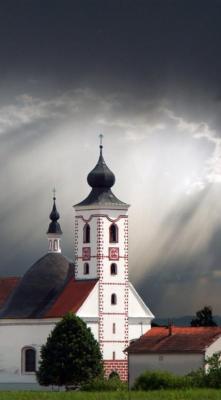 Beatify a war criminal and get a financial concordat
Beatify a war criminal and get a financial concordat
Had Franjo Tudjman, the first president of Croatia, lived longer he might have been convicted of war crimes committed in the civil war of the 1990s. For politicians shunned by the world, a concordat with the Vatican means welcome acceptance and, in fact, Tudjman concluded four of them. In 1998, just before the financial concordat was signed, the Vatican sweetened the deal by beatifying an archbishop convicted as a war criminal for complicity in the WWII Croatian Holocaust.
 Croatia is a beautiful land with an ugly past. It has Adriatic islands like Hvar, with “sleepy villages dotted among the lavender-clad fields that colour the island mauve in summer and infuse the air with the shrub's sweet scent.” [1] Yet it is also known for the Croatian Holocaust during WWII and, after that, for the long and bloody Croatian War of Independence in the early 1990s.
Croatia is a beautiful land with an ugly past. It has Adriatic islands like Hvar, with “sleepy villages dotted among the lavender-clad fields that colour the island mauve in summer and infuse the air with the shrub's sweet scent.” [1] Yet it is also known for the Croatian Holocaust during WWII and, after that, for the long and bloody Croatian War of Independence in the early 1990s.
Croatia, which hadn't been independent since the Middle Ages, finally got the prospect of nationhood when Yugoslavia broke up at the end of Communism in Europe. The Republic of Croatia declared independence, but the ethnic Serbs living within its boundaries wanted their areas to be annexed to Serbia and a bloody conflict ensued. Croatia's first President was Franjo Tudjman who held office from 1990 until his death in 1999. Senior judges have said that had he lived longer he would have been convicted of war crimes by several international tribunals. [2] Before he died his government concluded four concordats with the Vatican.
In 1993, before the first round of concordats, Pope John Paul II honoured the new country with a visit. Then on 2-4 October 1998, he returned once more to Croatia to beatify Archbishop Stepinac, thus pronouncing “Blessed” a Churchman convicted as a war criminal for complicity in the Croatian Holocaust during WWII.
No one need take anything on faith: a fascinating collection of online documents makes clear the close co-operation of both Stepinac and the Catholic Church with this murderous regime. [3] The Archbishop himself headed the state's new Office of Religious Affairs to handle the conversion of Serbs to Catholicism. Across Croatia priests were instructed to inform the Serbian population that they must choose between conversion and death. [4] And sometimes they got both. [5]
Yet even though Stepinac's beatification in 1998 called forth protests, honouring him was an adroit move on the part of the Vatican. This let the Church stress that it was the Communists who had, in the end, gaoled the Archbishop as a war criminal— (as if no one else would have). Styling Stepinac as a martyr also let it gloss over his comfortable conditions during his five-year prison term, his early release and the fact that he'd died peacefully at home many years later.
Despite all this, the John Paul II managed to conclude that the archbishop had “endured in his own body and his own spirit the atrocities of the Communist system” and thereby earned the crown of martyrdom. [6] With this, the Pope recast Croatia's darkest period as a glorious struggle against godless Communism. ...A few days after this papal speech Croatia obligingly signed the Vatican's financial concordat.
Notes
1. Annabelle Thorpe, “How Hvar got hip”, Observer, 18 May 2008. http://www.guardian.co.uk/travel/2008/may/18/hotels.croatia
2. “Franjo TuÄ‘man”, Bosnian War, Wikipedia. http://en.wikipedia.org/wiki/Franjo_Tu%C4%91man#Bosnian_War
3. “The Independent State of Croatia: 1941-1945”, Jasenovac-Donja Gradina, Industry of Death 1941-1945. http://www.jasenovac-info.com/cd/biblioteka/pavelicpapers/isc/index.html
4. "Serbian civilians are forcibly converted to Catholicism by a Croatian priest", United States Holocaust Memorial Museum, Photograph #90166.
http://digitalassets.ushmm.org/photoarchives/detail.aspx?id=1139416
5. "Serbian civilians who are being forced to convert to Catholicism by the Ustasa regime stand in front of a baptismal font in a church in Glina", United States Holocaust Memorial Museum, Photograph #90163.
http://digitalassets.ushmm.org/photoarchives/detail.aspx?id=1075125
6. Richard Boudreaux, “Pope Beatifies WWII Croat Nationalist”, Los Angeles Times, 4 October 1998. http://articles.latimes.com/1998/oct/04/news/mn-29361







